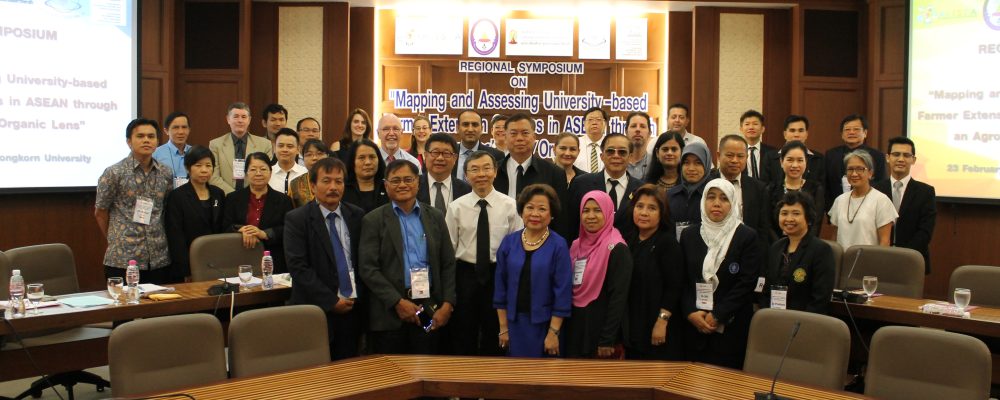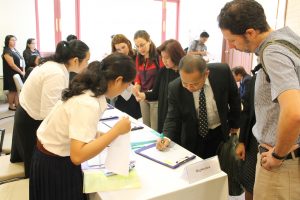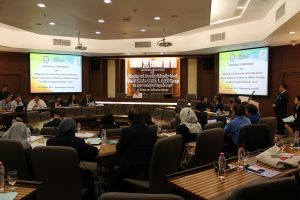“We agree there are very different policies and priorities between all countries, but the common point is that they are all working under the Sustainable Development Goals (SDGs) framework. The main problem though is that SDGs do not mention organic agriculture at all, they do not mention Agro-ecology either. That is where the university needs to become involved.”
Wayne Nelles, Visiting scholar, CUSAR, and Facilitator of the Symposium.
On Thursday 23th of February 2017, Chulalongkorn University, School of Agricultural Resources (CUSAR) hosted a regional symposium about University-based Farmer Extension Services & Agroecology with the support avec the Agroecology Learning Alliance (ALiSEA) and United Nation Educational, Scientific and Cultural Organization (UNESCO).
This event was a unique opportunity to bring together scholars from eight different nationalities among ASEAN countries. Were represented Indonesia, Laos, Malaysia, Myanmar, Philippines, Thailand, and Viet Nam. Here are all speakers’ profile:
The symposium came after a one-year study lead by researchers who have been working on the role of post-secondary institutions and research institutions in farmer extension services. They presented their conclusions on how these institutions either enable or inhibit agro-ecological transition, through various case studies from each country. Here is the final symposium program: FINAL_Program_(23 Feb 2017)_Chula_Ext_Res_Symposium
This year of research on University-based Farmer Extension Services intended to:
- Explore what roles universities play in either exacerbating or mitigating environment, food security, poverty reduction and agricultural development challenges in ASEAN and contribute to social or rural transformation.
- Understand through quantitative empirical evidence combined with good qualitative analysis, how, why and to what degrees Southeast Asian universities inhibit or support agro-ecological and organic approaches in teaching, research and extension services.
- Provide policy, program and curricular recommendations for future education, research and extension services and rural development planning in response to perceived knowledge and capacity gaps.
Eventually, all the results and conclusions presented during the symposium will be published in a book gathering case studies from the eight countries.
After opening speeches from representants of Chulalongkorn University, Associate Professor, Dr. Kanisak Oraveerakul, Professor Kiat Ruxrungtham and Asst. Prof Dr. Jakkrit Sangkhamanee, the Representative of Thailand Department of Agricultural Extension (DOAE) presented the government’s strategy regarding organic and sustainable agriculture extension systems. Intro_DOAE_Extention_Organic
Each session of the symposium was supported by presentations that can be downloaded through their weblink below. Here is the final report : Final_Report_Regional_Symposium_Chulalongkorn_University
- SESSION ONE: Project Contexts, Theoretical Issues: An ASEAN And Mekong Region Perspectives On Agriculture Education And Extension Networks
Challenges and Opportunities for a University Network on Agro-ecological/Organic Farmer Extension Services in ASEAN, Dr. Wayne Nelles (Visiting Scholar in CUSAR) S1_Wayne_challenges_and_opportunities
Comparative analysis on CLMV countries’ policies in regards to Agroecology, Pierre Ferrand (ALiSEA / GRET) S1_Pierre_Ferrand_comparative_analysis
Mapping and Assessing University-Based Farmer Extension Services: Perspective from the Global Forum For Rural Advisory Services, Dr. Virginia Cardenas (Global Forum for Rural Advisory Services (GFRAS)) S1_Cardenas_GFRAs
Reducing research-extension gap for sustainable agricultural development: The role of networks, Ms. Martina Spisiakova (Asia-Pacific Association of Agricultural Research Institutions (APAARI) S1_Spisiakova_APAARI_networks
- SESSION TWO: National Case Studies (1), Focal Point Teams – Malaysia, Myanmar and Thailand
Malaysia: University-Based Agriculture Extension Services In Asean Through An Agro-Ecological/Organic Lens-Malaysian Case, Dr. Norsida Man (University Putra Malaysia (UPM) S2-Dr-Norsida-Malaysia
Myanmar:
- University-based Extension Service in Myanmar, Dr. Nyein Nyein Htwe (Yezin Agricultural University (YAU) S2_Nyein_Nyein_Htwe_Myanmar
- Myanmar Agricultural Extension in Agricultural Development, Dr. Khin Oo (Yezin Agricultural university YAU) S2_Khin_Oo_Myanmar
- Quick Overview of Sources of Agriculture Knowledge for Myanmar Farmers, Dr. Htet Kyu (ALiSEA / GRET) S2_Htet_Kyu_Myanmar
Thailand: higher Education and Agricultural Extension Services in Thailand: Current situation and Future Recommandations, Dr. Supawan Visetnoi (CUSAR) S2_Supawan_Thailand
- SESSION THREE: National Case Studies (2), Focal Point Teams – Cambodia, Laos and Viet Nam
Cambodia: Sustainable Agricultural Research and Extension in Cambodian Higher Education Institutions, Mr. Chun Nimul (Svay Rieng university) and Dr. Buntong Borarin (Royal University of Agriculture) S3_CHUN_Nimul_and_BUNTONG_Borarin
Laos: Mapping and Assessing University-based Farmer Extension Services in Laos through an Agro-ecological/Organic Lens, Dr. Saythong Vilayvong and Dr. Malavanh Chittavong (NUOL) S3_Saythong_Vilayvong
Vietnam:
- University-based extension education and services in Vietnam, Dr. Pham Van Hoi (Center for Agricultural research and Ecological studies (CARES) and Vietnam National University of Agriculture) S3_Pham_Van_Hoi_Vietnam
- Agricultural Extension In Vietnam: Current Status And Challenges, Dr. Nguyen Thanh Binh (Mekong Delta Development Research Institute, Can Tho University (MDI-CTU) S3_Binh_Vietnam
- SESSION FOUR: National Case Studies (3), Focal Point Team – Indonesia and Philippines
Indonesia:
- Challenges and Opportunities for Universities-based Agricultural Extension Services from an Agroecological/ Organic Perspectives: the Case of Indonesia, Dr. Siti Amanah (Bogor Agricultural University and GFRAS) and Dr. Epsi Euriga (Yogyakarta Agricultural Extension College) S4_Siti_Amanah_and_Epsi_Euriga_Indonesia
- Integrating Sustainability Factor into University-based Agriculture Extension Services: A case study from Indonesia, Dr. Helmi and Rafnel Azhari (Andalas University) S4_Helmi_and_Rafnel_AZHARI_Indonesia
Philippines: An Assessment of University Based Farmer Extension Services in the Philippines Through Agro-Ecological /Organic Lens, Dr. Ted Mendoza (University of the Philippines Los Baños (UPLB), Dr. Virginia Cardenas (UPLB and GFRAS) and Cely Binoya (APEAEN / CHED) S4_Mendoza_et_aL_Philippines
- SESSION FIVE & SIX: Final Reflections: Expert Presenters and Participants (Open dialogue); Wrap-up Remarks and Next Steps
The two last sessions have been merged and have led to an open dialogue between participants in order to build on previous presentations and draw some general conclusions regarding the ASEAN region as a whole.



